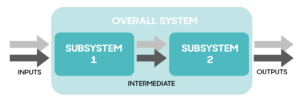
At its core, transparency provides knowledge and understanding. This benefit alone is important enough for an organization to value transparency in and of itself. Yet, the virtue of transparency provides endless additional value for our organizations today.
A Systems Definition of Transparency
Understanding transparency begins with understanding systems. At ProdPerfect, we all work on systems, whether we’re in Marketing, Sales, Delivery, Engineering, Operations, or any other team. Every person has at least one system that they work on. And every system has both inputs and outputs.
Being transparent about our work means that each of us can explain what systems we work on, what resources those systems take, and if the system can produce. It is even better when a person can clearly explain why their system works, because this requires explaining a system’s underlying pieces and how these pieces connect.
Providing systematic transparency matters because it provides a guide for both understanding the present and predicting the future, as well as understanding the levers that could change the future:
-
- Past inputs -> Past or current outputs
- Future inputs -> Future outputs
At ProdPerfect, our team has a mantra: “See one, do one, teach one.” This mantra represents the path of a learner through experience. This path of mastery culminates in being able to clearly teach others. By providing transparency of systems under our ownership, we attain this true mastery.
Transparency Enables Error Correction
Sharing our understanding allows us to both resolve issues in which we misunderstand ourselves and give others opportunities to provide us feedback. Since mistakes can occur anywhere and every action is built upon others, little failures often build up. In many cases, these failures can cause a system to fail. Transparent systems provide opportunities for good feedback, which can then prevent systematic breakdown and systemic burnout. In short, transparency allows participants to take action before a system spirals out of control.
Transparency Enables Egalitarianism
One of the most powerful concepts of egalitarianism is that while not every person will take more responsibility, each person has the potential to take responsibility. Similarly, we believe that all individuals should have the opportunity to grow. Every individual in the company should have a path–no matter how challenging–towards mastery of any skill.
The business impacts every stakeholder within the organization, so there is always a reason for stakeholders to learn business information. Some of this information may be challenging to understand and sensitive or even dangerous for the business, its customers, and personal privacy. For these reasons, each individual should have the right to access business information in all but the most extreme cases. Even in extreme cases, organizations should provide stakeholders reasons for any withheld information.
Transparency Enables Trust
Finally, transparency builds trust, and trust erodes without transparency. Trust is different from faith: whereas trust is an understood and reasoned expectation of reliability, faith is expectation and reliance without understanding. Our organization does not ask for faith, but we do practice transparency to deepen our understanding of one another. Transparency shows we are not enforcing domination over others and that our processes are sufficiently accurate and truthful.
In exchange for transparency, we ask for trust from our stakeholders. We expect our stakeholders to trust us and one another in response to the transparency we provide them. When the provided transparency is insufficient, we will ask first for a dialogue to resolve any relevant issues or concerns.
Transparency is relevant not just from a company-to-individual, but from an individual-to-individual standpoint. Individual-to-individual transparency builds strong interpersonal relationships through direct communication. Being transparent thus supports a culture in which gossip can not take root and teammates know they can trust one another’s actions.
The Limits of Transparency
Ultimately, an individual’s opportunity to be transparent in a system only goes as far as the individual’s understanding of the system itself. Because individual understanding is limited, any individual’s understanding of a system will fall off the further they get from systems in which they have predictive, explanatory, and transparent mastery.
For this reason, we ask for all individuals to humbly recognize and reserve judgment as they get further from the realms of their personal understanding. The organization works hard to provide as much transparency as possible to the mission-critical, high-level components of the business. Grokking the lower-level systems takes more time. Though understanding of these systems should be provided, it also must be prioritized in balance with the needs of the organization’s mission and value system, which extend beyond the scope of any one of its individuals.


